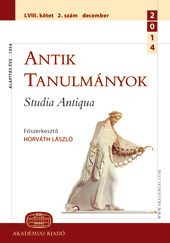A pásztor és a szirének. Megjegyzések Apollónios Rhodios Butés-elbeszéléséhez (Arg. IV, 885–921)
The Shepherd and the Sirens. Notes to Apolloniton's Rhodios Butes (Arg. IV, 885-921)
Author(s): Elvira PatakiSubject(s): Cultural history, Ancient World, Greek Literature, Theory of Literature
Published by: Akadémiai Kiadó
Keywords: Apollonios of Rhodes; Butes; Sirens; Orpheus; Homer; Hesiod; Plato; enthusiasmos;
Summary/Abstract: The aim of the paper is to examine the Apollonian narration about Boutes. Mentioned never before in the tradition, he seems to belong to the many minor characters of the Argonautica, who could emerge into the surface of the events only being heroi eponymoi of local aetiological myths giving a historical-geographical credibility to the narration. Nevertheless, the myth of Boutes is more profound than a marginal foundation story. While his name evokes pastoral ideas, his figure is strictly attached to Orpheus, which places him into an aesthetic context. He becomes protagonist at the crucial meeting with the Sirens, when Orpheus, to save his fellows, opposes the dangerous voice of bird-maidens by making curious sounds, without being able to prevent Boutes, captivated by the song of Sirens, from jumping into the see and swimming to them. The man lost in the waves is saved by Aphrodite, who raises him as paredros at her mountain sanctuary. The article, after analyzing the relationship of the new Apollonian myth with the Homeric episode of Sirens, searches other literary models of this particular story. The figure of the shepherd delighted by the music and semi-divinised by the love of a goddess evokes the Hesiodic scene of poetical initiation as well as the figure of Anchises, shepherd-musician of the Homeric Hymn to Aphrodite, while the iuxtaposition of a shepherd and the Sirens would make an allusion to the Platonic passage on enthusiasm in Phaedrus. The story of Boutes can be regarded as an indirect poetic commentary on these main texts of the Greek aesthetics thought about poetry and knowledge.
Journal: Antik Tanulmányok
- Issue Year: 60/2016
- Issue No: 1
- Page Range: 1-32
- Page Count: 32
- Language: Hungarian
- Content File-PDF

